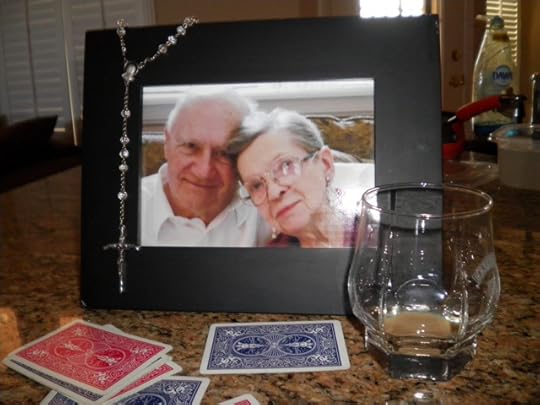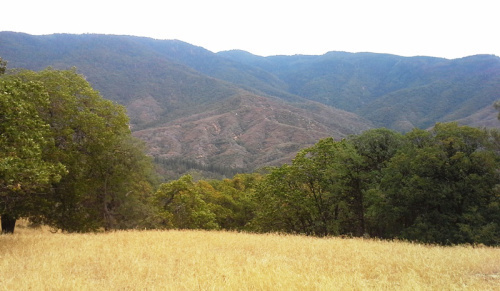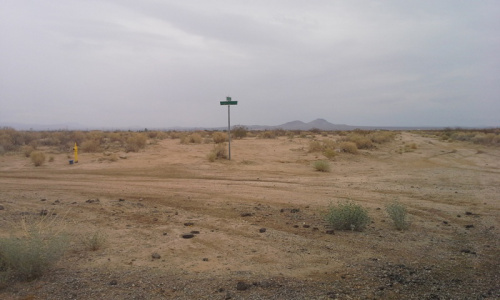Pat Bertram's Blog, page 188
August 19, 2014
Update on Writing, Spirits, and Other Matters
Lately I’ve been hearing about all sorts of blatant plagiarism, where “authors” steal another writer’s published book, adding sex scenes or scrambling a few words and passing it off as their own. In one case, a plagiarist stole the exact cover of the book. In this brave new world of publishing where anything goes, it’s harder than ever to keep control of one’s own work. Once it’s in the public eye, the book is available to anyone with a few cents for an ebook download. Chances are, the plagiarized book would be lost in the millions of books now available, and even if the crime was discovered, most self-published authors don’t have the money to fight such infringements, and even if they did, it’s one person’s word against the other. Many self published authors don’t even bother to register their books with the copyright office in their country because once a book is written, it’s automatically covered under copyright laws. But courts are a different matter. They need the official copyright to proceed with trials and repercussions.
 I’ve never quite known what to do about publishing my work. For now, I have a publisher, but when I get back to writing Ms. Cicy’s Nightmare, a murder mystery based on my dance class, I will continue publishing it on my blog, the way I started. (I am a bit embarrassed that the book is in hiatus after a single chapter, but in my defense, as soon as I cleared the month of July to write, life filled the void with all sorts of traumas and family dramas, which I am only now recovering from.) But when the book is finished? I might or might not get an official copyright. I am not litigious, so chances are I wouldn’t take any copyright infringement to court. Besides, I could easily prove the book is mine since the names of my characters will reflect their real-life personas. At least, that’s the plan. Besides, I don’t much like government intervention of any kind, even if it’s in my best interests.
I’ve never quite known what to do about publishing my work. For now, I have a publisher, but when I get back to writing Ms. Cicy’s Nightmare, a murder mystery based on my dance class, I will continue publishing it on my blog, the way I started. (I am a bit embarrassed that the book is in hiatus after a single chapter, but in my defense, as soon as I cleared the month of July to write, life filled the void with all sorts of traumas and family dramas, which I am only now recovering from.) But when the book is finished? I might or might not get an official copyright. I am not litigious, so chances are I wouldn’t take any copyright infringement to court. Besides, I could easily prove the book is mine since the names of my characters will reflect their real-life personas. At least, that’s the plan. Besides, I don’t much like government intervention of any kind, even if it’s in my best interests.
The ordeals of the last month, including my father’s hospitalization, my brother’s, increased insanity and my trip to return him to Colorado have pretty much numbed my creativity. Since so many of the would-be perpetrators are on hiatus’s of their own — weddings, vacations, illnesses — I don’t have much impetus to write, but soon . . .
As for other updates:
My sister and I drank spirits to the spirits again tonight, if only to bolster our own spirits.
And lastly, I just got an email from Squidoo saying they been purchased by HubPages and that some of my content will be transferred to the HubPages site. Do you have any experience with HubPages? I’m trying to decide if I should just delete my Squidoo account and forget the whole thing or let them transfer my content.
***
Pat Bertram is the author of the suspense novels Light Bringer, More Deaths Than One, A Spark of Heavenly Fire, and Daughter Am I. Bertram is also the author of Grief: The Great Yearning, “an exquisite book, wrenching to read, and at the same time full of profound truths.” Connect with Pat on Google+. Like Pat on Facebook.
Tagged: copyright, dance class, hubpages, murder mystery, plagiarism, writing


August 18, 2014
The Challenges of Looking After an Aged Parent
Taking care of an aged parent is a challenge, with new tests — and testiness — arising every day. The biggest problem, of course, is that the parents want to be babied while giving up none of their parental authority. (They seem to forget that such authority had expired decades previously when we grew up, left home, and developed our own life with our own unique responsibilities.)
 A friend cautioned me against coming to take care of my father — she knew first hand the challenges I would face. But for the most part, he and I have managed to deal together okay, mostly because I adopted a policy of doing whatever he needed but nothing that he could do for himself. (He wanted me to wait on him like some unpaid servant, or like my mother did for the sixty years they were married.) After his recent hospitalization and an ensuing bout with pneumonia (he refused to sit in a chair or take walks while hospitalized, saying he had patients’ rights, and he had the right to refuse any treatment, so the pneumonia came as no surprise), I’m having a hard time resetting those parameters. He simply won’t do anything for himself, even though he is still strong and reasonably healthy for his age. (He says it tires him. I want to say “get over it,” though I don’t.)
A friend cautioned me against coming to take care of my father — she knew first hand the challenges I would face. But for the most part, he and I have managed to deal together okay, mostly because I adopted a policy of doing whatever he needed but nothing that he could do for himself. (He wanted me to wait on him like some unpaid servant, or like my mother did for the sixty years they were married.) After his recent hospitalization and an ensuing bout with pneumonia (he refused to sit in a chair or take walks while hospitalized, saying he had patients’ rights, and he had the right to refuse any treatment, so the pneumonia came as no surprise), I’m having a hard time resetting those parameters. He simply won’t do anything for himself, even though he is still strong and reasonably healthy for his age. (He says it tires him. I want to say “get over it,” though I don’t.)
And then there is the problem of the household finances. When he lost his ability to think clearly and keep enough numbers in his head to reconcile his accounts, he turned the household finances over to me.
Sort of.
When he is unwell, everything goes smoothly. He says he trusts me, and that I have permission to arrange matters (and papers) most convenient for me. When he is well, he forgets that trust, rummages around in his desk, puts everything back the way he had it, disarranges my work and makes my to-do list disappear.
Yikes. What a balancing act — letting him think he is still in control while making sure the bills get paid and balky appliances get fixed.
I figure if he’s well enough to mess around with such matters, he’s well enough to get his own meager meals, but he doesn’t see it that way. I try to be patient, realizing it must be hard to be ninety-seven years old and dependent on a daughter, but I also can’t forget that I am that daughter, with a life of my own. I never took a vow of obedience to him. Never signed on to be a servant. I’m just the designated daughter, the unattached one who got stuck with the awkward situation.
I’m hoping in the next week or so things smooth out and I can stop being at his beck and call. Well, I will stop — that’s a given. I just don’t know how that will sit with him.
And so it continues, my paying the wages of daughterhood.
***
Pat Bertram is the author of the suspense novels Light Bringer, More Deaths Than One, A Spark of Heavenly Fire, and Daughter Am I. Bertram is also the author of Grief: The Great Yearning, “an exquisite book, wrenching to read, and at the same time full of profound truths.” Connect with Pat on Google+. Like Pat on Facebook.
Tagged: caring for aged parents, caring for elderly parents, challenges of dealing with elderly parents


August 17, 2014
Invoking the Spirits
There is a restless spirit in my father’s house, where my sister and I are staying to care for him.
We think this spirit is my father’s. He doesn’t seem to have any interest in living, doesn’t particularly want to die. He is very agitated, doesn’t much want to do anything except sleep and drink Ensure, though he does get out of bed occasionally when a good golf game is on television.
This spirit could be our own spent spirits — taking care of someone who neither wants to live or die is exhausting, especially since he won’t do anything for himself, even though he is stronger than he thinks.
This spirit could even be my mother’s. My sister sometimes senses mother’s spirit here along with another ghost, though she doesn’t know who that other spirit is, perhaps someone from my father’s past. She wonders if the spirits are gathering in anticipation of my father’s end. Since I am not convinced anything conscious remains after we die, I don’t know what to think.
Still, tonight my sister and I did an invocation of the spirits — ours and our mother’s. Since she loved Bailey’s Irish Cream, we got a bottle in her honor, raised our glasses to her and asked her help in settling my father’s spirit.
(We only poured a little for her, but we told her if she drank it, we’d give her more.)
And if this invocation doesn’t work, well, we have the rest of the bottle of Irish spirits to imbibe to bring peace of a sort to ourselves. I’m not much of a drinker, have had perhaps one drink in the past four or five years, but since this is a spiritual quest, I will do my part in finishing the bottle.
So, if you have any Bailey’s Irish Cream on hand (or if you need an excuse to buy a small bottle), please raise a glass in my parents’ honor.
***
Pat Bertram is the author of the suspense novels Light Bringer, More Deaths Than One, A Spark of Heavenly Fire, and Daughter Am I. Bertram is also the author of Grief: The Great Yearning, “an exquisite book, wrenching to read, and at the same time full of profound truths.” Connect with Pat on Google+. Like Pat on Facebook.
Tagged: Bailey's Irish Cream, drinking to the dead, restless spirits


August 16, 2014
Excerpt from LIGHT BRINGER by Pat Bertram
Description of Light Bringer:
 Becka Johnson had been abandoned on the doorstep of a remote cabin in Chalcedony, Colorado when she was a baby. Now, thirty-seven years later, she has returned to Chalcedony to discover her identity, but she only finds more questions. Who has been looking for her all those years? Why are those same people interested in fellow newcomer Philip Hansen? Who is Philip, and why does her body sing in harmony with his? And what do either of them have to do with a shadow corporation that once operated a secret underground installation in the area?
Becka Johnson had been abandoned on the doorstep of a remote cabin in Chalcedony, Colorado when she was a baby. Now, thirty-seven years later, she has returned to Chalcedony to discover her identity, but she only finds more questions. Who has been looking for her all those years? Why are those same people interested in fellow newcomer Philip Hansen? Who is Philip, and why does her body sing in harmony with his? And what do either of them have to do with a shadow corporation that once operated a secret underground installation in the area?
Excerpt from Light Bringer:
As Special Assistant to the Director of Logistics and Deployment, Teodora, also known as The Fixer, had the best and brightest operatives the department had to offer. Intelligence agencies all over the world recommended their top young agents, hoping to cement their relationship to the powerful organization. The Deputy Director of the FBI himself had written recommendations for Keith Derrick and Hugh Wittier, mentioning their athletic accomplishments, superior scholastic standings at their respective Ivy League Universities, and exceptional performances at the FBI academy.
Teodora studied the two handsome young men visible on the split screen of her computer. They might have impressive pedigrees and extensive training, but they were unskilled liars. She didn’t even need the voice stress analyzer built into her computer to tell her they were deviating from the truth; changes in the size of their pupils and arrested movements of their hands betrayed them. Unfortunately, she could not tell which specific incident they were lying about; their involuntary reactions had begun as soon as Keith opened his mouth to give the report.
They would not be concerned with her knowing they had presented themselves as NSA agents; all her operatives used whatever tools were necessary to get the job done. They would not be concerned with her knowing about the stolen car; they had reported it immediately. They would not be concerned with her knowing the subject had apparently been expecting them or that he had assumed they were interested in the books he read. That left the man—the tall bearded man wearing dark sunglasses and a green tracksuit—who had come out of the bedroom aiming a pistol.
If this gunman did exist, who was he? The subject had no close friends. They only knew about Emery Hill because the operatives found a note wedged in the rear of a desk drawer when they had gone back and combed the apartment.
If the gunman did not exist, how had the subject escaped? And why? Hugh and Keith had been sent simply to ask him what he knew about his mother’s cousin and her ward.
Teodora made a mental note to have her computer technicians look deeper into the subject’s background, then gave the operatives her undivided attention.
Hugh stared out at her from the computer screen. “Why are we looking for these women?”
“They have information.”
“We still have not found out what Hansen knows about them,” Keith said, “and the only item we found in his apartment that might be germane is the photograph album we sent you.”
“Is your fax machine set up?”
Keith nodded.
She faxed them one of the photographs her technicians had altered to show what the females might look like today. Keith reached for the fax, scrutinized it, then handed it to his partner.
A faint line appeared between Hugh’s brows. “I saw the younger woman walk by the coffee shop in Chalcedony.”
Keith snatched the picture and gave it a second look. “I didn’t see her.”
Hugh lifted one shoulder in a barely perceptible shrug.
Teodora made certain that her expression remained blank, but she could not keep her heart from beating faster.
“Find her,” she said.
***
Where to buy Light Bringer:
Palm Doc (PDB) (for Palm reading devices)
Epub (Apple iPad/iBooks, Nook, Sony Reader, Kobo)
Tagged: Colorado, fiction, Light Bringer, mystery, novel, search for identity, Second Wind Publishing


August 15, 2014
We Can Never Know What Life Will Bring Us
My life is slowly winding down . . . Hmmm. That sounds ominous. Let me rephrase the sentence. The dramas and traumas of my life are slowly winding down — my life itself is going strong.
My brother is gone from the area, my father is sleeping most of the time, my sinus infection is mostly healed, my sister is trying to decide if she wants to continue catering to my father’s whims and needs or if she wants to head out. And I’m left wondering what the heck happened during the past fifteen months.
Fifteen months ago, I was mostly housebound. My father set the burglar alarm when he went to bed somewhere been 7 and 9 pm, and he wouldn’t give me the alarm code. (His compromised health made him even more paranoid than normal. I have no idea what he thought I’d do while he was asleep. Debauched parties, maybe.) Such imprisonment seems barbaric to me now, but at the time, I was still struggling to find a way out of grief for my life mate/soul mate, and nothing really mattered. Even worse, my then ninety-six-year-old father was ill, had just been released from the hospital, and I wasn’t sure he’d make it. I was waiting on him, doing whatever he wanted because he claimed he was too ill even to walk to the kitchen to get food for himself (afterward he said he thought I liked doing it, as if by letting me wait on him, he was granting me a favor). Hanging around all  day and nursing him was making me feel even more imprisoned.
day and nursing him was making me feel even more imprisoned.
And then my homeless brother, who had long been estranged from my father, showed up to try to make amends. Within the month, my father came alive, shouting at my brother for innocuous little offenses that my brother couldn’t even understand. (Like being too quiet. Like eating food that had been purchased for my father. Like interrupting the old man while he was praying.) Things got worse, and finally, against my wishes, my father kicked my brother out of the house, just as he had done when my brother was sixteen.
This isn’t meant to be about my father and brother, though my father’s actions toward my brother precipitated the hell my life became. It’s about me. How my father’s resurrection angered me and allowed me to take my life back. If he had energy enough for tantrums and fights, why the heck was I catering to his every need as if he were an invalid? And so, when I found a nearby dance studio, I signed up for lessons, more for something to do than anything else, and I fell in love with dance. The very same day I took my first dance class, I also discovered the Sierra Club walk, and so my life opened up even more. I came alive.
We are gradually ending back where we started, with just me and my father. But those fifteen months are still to be reckoned with. They were some of the most horrific months of my life, dealing with both my father and dysfunctional brother. But they were also some of the most wonderful months of my life, learning to dance and making new friends.
I don’t know if I’ll ever make sense of it all, but what I am left with is the feeling that no matter how we plan, no matter how much we think we are in control, we can never know what life will bring us. Fifteen months ago, I could never have conceived of the abuse from my schizoaffective brother, never have conceived of the heartbreak of saying goodbye, maybe forever. (The brother I knew is gone. I don’t know who that tormented and tormenting stranger is.) Fifteen months ago, my grief group friends were scattering to new lives and new loves, and I was mostly alone. I couldn’t have conceived of making so many delightful new friends. Fifteen months ago, I had absolutely no interest in dance, couldn’t even have conceived of the importance it could have in my life. And all those things happened without my making a single plan.
Of course, I will continue to plan — that is my nature. But I will also be aware that plans are simply that: plans. They aren’t life. They don’t have reality. Reality shows up all on its own.
***
Pat Bertram is the author of the suspense novels Light Bringer, More Deaths Than One, A Spark of Heavenly Fire, and Daughter Am I. Bertram is also the author of Grief: The Great Yearning, “an exquisite book, wrenching to read, and at the same time full of profound truths.” Connect with Pat on Google+. Like Pat on Facebook.
Tagged: dancing, father and brother fighting, schizoaffective brother, Sierra Club walk, tormented soul


August 14, 2014
Anything Goes
I’m feeling restless today, as if waiting for something to happen, though I’m not sure what. Life, perhaps. Or maybe death. My father is teetering on the brink, but he is still too connected to life to want to let go and too tired of it all to want to stay. At ninety-seven, and after two months of being mostly bedridden, he’s entitled. Still, his unrest leaves its imprint on the house.
I was fine at my dance classes today, going through our Hawaiian routines, playing our Tahitian numbers (I say playing because Tahitian more than any of the others, makes me feel light and free), and practicing paradiddles and on Broadway (or Shirley Temple or Spaghetti, depending on what era you learned to tap) and putting them together with flap-ball-changes for a little tap dance. I was even fine at lunch afterward. But when I walked into this house, I was beset by restlessness. (Which is why I am late with today’s post.) Couldn’t sit still, couldn’t think, couldn’t do much of anything.)
My sister and I spent the late afternoon baking one of our family’s childhood favorites, a sort of convocation or invocation of the spirits, seeing if perhaps our deceased mother would come help with our father. He seems more settled tonight, so perhaps she came. And we had our first meal together in — hmmm. I can’t remember the last time. Since we’ve been taking turns looking after our father, we are seldom both here at the same time except at night.
We’ve had our times of not getting along — we are just too different — but tonight we were in perfect accord, she working the dough and me fixing the filling.
This isn’t exactly a recipe-type blog, but what the heck — it’s become something of a diary, so anything goes, right?
Hamburger Rolls
Combine 2 Tablespoons sugar, 1½ teas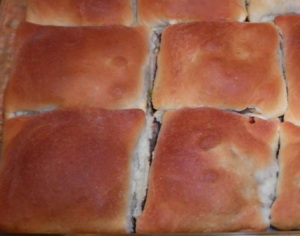 poon salt, 3 tablespoons shortening. Add ½ cup boiling water; stir well until dissolved. Add ½ cup milk then add 1 cake yeast crumbled. Blend in 3 cups sifted flour. Let rise once until double, roll out ¼” thick, and cut in squares approximately 3”x3”. Place a couple of tablespoonfuls of hamburger/cabbage filling to in the middle of the square, fold corners of dough to the center and pinch closed. Put rolls in greased and let rise a about 30 minutes. Cook 15 to 20 minutes at 400°.
poon salt, 3 tablespoons shortening. Add ½ cup boiling water; stir well until dissolved. Add ½ cup milk then add 1 cake yeast crumbled. Blend in 3 cups sifted flour. Let rise once until double, roll out ¼” thick, and cut in squares approximately 3”x3”. Place a couple of tablespoonfuls of hamburger/cabbage filling to in the middle of the square, fold corners of dough to the center and pinch closed. Put rolls in greased and let rise a about 30 minutes. Cook 15 to 20 minutes at 400°.
Filling
Brown 1½ lbs ground beef, skim off grease. Slice cabbage (that had been boiled until tender) and some onion, add to ground beef. Season with parsley flakes, salt, pepper. Cook with cover on for 10 minutes.
***
Pat Bertram is the author of the suspense novels Light Bringer, More Deaths Than One, A Spark of Heavenly Fire, and Daughter Am I. Bertram is also the author of Grief: The Great Yearning, “an exquisite book, wrenching to read, and at the same time full of profound truths.” Connect with Pat on Google+. Like Pat on Facebook.
Tagged: childhood favorites, family recipe, feeling restless, Hamburger Rolls


August 13, 2014
Where Things Make Sense
Dance class still remains the one bright spot of my days, a place I can go where things make sense, where music and beauty are more important than death and sickness, where choreographed movement is powerful enough to tame even the chaos of my life. (Even though my abusive brother is gone, my 97-year-old father is still riding the rollercoaster of old age, alternating between neediness and the need to control, between accepting God’s will and clawing to live, between practiced saintliness and grumpiness.)
During the 3000 miles I traveled on my recent journey, I never once felt at home, not even when I returned to my home state (where technically I am still a resident). I certainly didn’t feel at home when I came back to my father’s house — for me this lovely house has always been a place of death and dying, mental imbalance and grief. (Only the grief was mine. The death, dying, and mental imbalance belonged, in order, to my mother, father, brother.) The one time I felt I had arrived anywhere was when I stopped by the dance studio after my trip. The teacher and my fellow students greeted me with delighted smiles and hugs, held me while I wept, took me to lunch. (Even though they didn’t all understand my tears, considering the abuse I’d been subjected to by my brother, they did understand grief.)
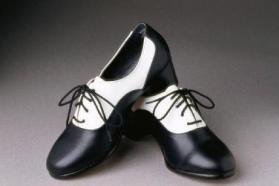 I’m still fighting an allergy-induced sinus infection that kept me from class yesterday, but I was determined to go to jazz class today. I’m glad I went. After we did our warm-ups, we started learning a new dance.
I’m still fighting an allergy-induced sinus infection that kept me from class yesterday, but I was determined to go to jazz class today. I’m glad I went. After we did our warm-ups, we started learning a new dance.
A year ago, when I took my first jazz lesson, I wasn’t sure I’d ever learn the steps. I couldn’t tell what the teacher was doing, couldn’t pick up her cues fast enough, couldn’t make my arms and feet do different things at the same time. By the end of the month, I knew enough so I could write down the first steps of the dance, and I practiced. Now I know that dance plus two others. And today we started a fourth.
During class, while she was counting out the beat as I’ve seen so often in movies — five, six, seven, eight — joy welled up inside me. I was dancing! Actually dancing. Me, who previously could only balter. (Means dance clumsily, for those of you who don’t want to look it up.) Actually, that’s not exactly true. I just wanted to use the word “balter”. I was simply a neophyte. My dancing up to a year ago had mostly been bobbing to a beat, though I did sort of know a polka step that my Polish mother had once tried to teach me before losing patience with my lack of rhythm. (Around that same time, my once-upon-a-time tennis champion father tried for an hour one day to teach me tennis before losing patience with my lack of talent.)
I don’t know where my life is headed. Well, obviously, none of us do. But big changes are coming and soon I won’t have a place to go, nowhere to call home, no place I particularly want to live, no one in particular to make a life with.
But for now, there is one thing I want (need!) to be . . .
Dancing.
***
Pat Bertram is the author of the suspense novels Light Bringer, More Deaths Than One, A Spark of Heavenly Fire, and Daughter Am I. Bertram is also the author of Grief: The Great Yearning, “an exquisite book, wrenching to read, and at the same time full of profound truths.” Connect with Pat on Google+. Like Pat on Facebook.
Tagged: dancing, God's will, importance of dance, jazz, jazz dance, where I need to be, where things make sense


August 12, 2014
A Trip to Eternity
Right before I took my brother home to Colorado, I took another trip, one just for me. In its own way, this first trip is as incomprehensible as the second one, and together they comprise a very strange and mystical journey.
I had nowhere in particular to go on my sojourn, so I headed north to visit a friend I’d only met offline once. I had enjoyed our visit so much that I thought I like to take her out to dinner and visit some more. When I realized there was no way I’d get to her place early enough to have dinner with her, I decided to head west toward the ocean. I was experiencing a brief grief upsurge because I’d just talked to my bank about removing Jeff from our joint account, something I’d resisted all these years, and it felt like one more little death.
“What’s it all about, Jeff?” I sobbed. “Have you figured it out yet?”
There was no answer, of course. He has never answered me in any way I could understand. I continued driving west on the same highway, but somewhere along the line the highway must have veered off, and I ended up on a narrow two-lane road that seemed to be going north. The road curved, and vineyards hugged the hillsides. Although Jeff had never visited any vineyards, he had a special affinity for them, and collected any movie he could that featured such terrain, such as A Walk in the Clouds.
I stopped at one vineyard where a musical event and barbecue were going on, sat for a while and enjoyed a glass of sangria, good barbecue, and satisfactory (though too loud) music, then I continued my journey.
I ended up at the coast in the dark. I stood at the water’s edge, listening to the surf and watching the tides come in (or out), then I went to find a place to stay for the night.
As you might expect, there was no vacancy anywhere by the beach on that Friday night at the beginning of August. I headed inland, drove for hours on a winding road with no shoulder, no turnoffs, and no other cars, but finally ended up at a motel around midnight. The next morning, I talked to my friend about dinner plans, but she was unavailable, so I headed west again with a full tank of gas. Again I ended up on a winding road with no shoulder, no turnoffs, and only a few other cars. I couldn’t see where I was going or where I had come from since most of the road was lost in the curves. All I had was the moment, and the moment was lovely.
When I was down to less than a quarter of a tank, I began to wonder if I would find a gas station before I ran out of gas. I didn’t much care, except that there was no place to pull off the road if I did. When I came upon a small market, I stopped and asked the woman at the cash register if there was a nearby gas station.
“Where are you going?” the woman asked.
“I don’t know,” I said.
She stared at me blankly and asked, “Where did come from?”
“I don’t know,” I said. “I don’t even know where I am. I’m just driving.”
She nodded, then admitted there was a gas station up ahead about twenty-five miles on the road to Lake Isobel.
“I know where Lake Isobel is,” I said.
“It’s desert,” she told me. “Not very pretty. Since you’re out for a drive, you should turn left instead of right when you reach the end of this road and go to Ponderosa.”
I bought a peach and chips and thanked her for her help, then continued on my way. The stop at the gas station on the Lake Isobel Road was like a stop in a foreign land. I had no idea what language they spoke, didn’t understand a word they said to me, they didn’t understand a word I said, but after a frustrating half hour I had a full tank of gas.
I turned left, of course. The scenery was remarkably beautiful.
I meandered along, stopping occasionally to take photos, and when I came to a parking area, I paid the price and took a break for a walk. “Trail of 100 Giants” proclaimed a sign, and so I found myself walking among the giant sequoias. Oh, my. Such beauty. Even the carnival atmosphere of the other visitors couldn’t mar the cathedral-like air of that awesome place.
The next day, I found myself within a few miles of California City, a platted area designed to be a megalopolis in the middle of the desert, and since I’d always been fascinated by the idea of the place, I took a quick look. Oddly, the roads and signposts of this city-that-never-was still surround the town.
And finally, on my way back to my father’s house where I am temporarily residing, I took a turnoff to see The Devil’s Punchbowl, something I’d seen from afar, but never up close. The Devil’s Punchbowl is a huge scooped out area in the earth lined with magnificent boulders.
It was while wandering around the punchbowl that I glimpsed the scope of my journey. Though I do not truly believe in signs, it seems to me that the trip to the wine country was a message from Jeff (or from my own inner being speaking in a way I could understand) telling me to pay attention. From the vineyards, I’d gone to the eternal waters, to the eternal trees, to the eternal land, to the eternal rocks.
A trip to eternity.
Even though I know what the trip was, I don’t know what it means. Maybe that we are part of something bigger than we can know. Maybe that our lives mean more (or maybe less) than we think. Maybe that it will all come right in the end. Maybe that we are where we are supposed to be. Maybe that the universe really is unfolding the way it’s supposed to be. Maybe, more specifically, that it doesn’t matter about dropping my brother off in Colorado, that he will be all right.
I do know that when I drove back after leaving my brother in Colorado, the eternal moon stayed by my side all that night while I wept.
***
Pat Bertram is the author of the suspense novels Light Bringer, More Deaths Than One, A Spark of Heavenly Fire, and Daughter Am I. Bertram is also the author of Grief: The Great Yearning, “an exquisite book, wrenching to read, and at the same time full of profound truths.” Connect with Pat on Google+. Like Pat on Facebook.
Tagged: California City, Devil's Punchbowl, eternal rocks, eternal tree, giant sequoias, trip to eternity, vineyard, what's it all about


August 11, 2014
Rockin’ Pneumonia and the Boogie Woogie Flu
Well, no, I don’t have pneumonia or the flu. Nor do I feel much feel much like rockin’ since I have a sinus infection that has laid me low. (I always get sick when I travel, which makes my idea of going on the road after my father is gone a bit foolish.)
This infection has made me concentrate on myself and is helping me forget my brother. I tend to worry about him, though there’s nothing I can do for him. I tried to get him help while he was here, which came to nothing. I tried to protect him as much as I could, but only put myself in danger. Now that he’s back in his home state and on his own, he will have to take care of  himself as best as he can.
himself as best as he can.
When he was younger, the whole world was his backyard. He seemed to be able to live anywhere until he got the hoarder’s disease and became tied to “stuff.” (A lesson to me to get rid of even more of my stuff, though I doubt I will ever be able to do what my sister did — get rid of everything that didn’t fit in her car.) But now that he is older and developing physical problems as well as mental issues, the world seems alien to him. He says it’s changed, and that it scares him.
Still, he did want to go back to Colorado. If he can hold himself together long enough to make the rounds of social services, he will be okay. Could even end up with a small pension. He admitted he didn’t want to be here, that he got stuck, and perhaps in the end, I did for him what he couldn’t do for himself — get him out of here. (At least that’s what I tell myself, and for all I know, it might even be true.)
One of the reasons we needed him to go was that my father was rapidly declining. We didn’t think the old man had long to live, and the house couldn’t be put on the market with my brother living in the garage. But my father is doing better, so much so that he can be left alone some of the time. My sister, who came to help and who precipitated the exit of my brother, is thinking of leaving, and so once again it will be just me and my father in this house of ghosts.
Since my father needs to use a walker (though most of the time he carries it), he won’t be able to fix his meager meal (and if he could fix them, he wouldn’t be able to carry them), so I can fix his food before I leave for dance classes. (I’ve missed too many classes as it is, and will be missing more because of my sinus infection, and dancing holds me together.)
Mostly I’m just listening to old movies (watching them with my eyes closed, and dozing off periodically), drinking tea, and trying not to think of the next step, either the continued care of father, or what is in store for me when he is gone.
Thank you again for all your prayers, support, well wishes, thoughts, and comments during this trying time. You helped me in more ways than even I know.
***
Pat Bertram is the author of the suspense novels Light Bringer, More Deaths Than One, A Spark of Heavenly Fire, and Daughter Am I. Bertram is also the author of Grief: The Great Yearning, “an exquisite book, wrenching to read, and at the same time full of profound truths.” Connect with Pat on Google+. Like Pat on Facebook.
Tagged: caring for elderly parents, elderly father, house of ghosts, sinus infection, stuff


August 10, 2014
Wishing I Weren’t Sensitive
I wish I knew how to be insensitive, knew how to put matters out of my head and go on with my life as if nothing happened, but I don’t seem to be able to do that. Even after enduring months of being relentlessly hounded by my dysfunctional brother, even after I took him back to Colorado, I worry about him, worry about his well-being, wonder who he is aggravating, wonder what trouble his mouth is getting him into. There’s nothing I can do though, so worrying is foolish. I can’t control his behavior for him — no one can control another person’s behavior. I remember as a child wondering why he argued with my father since he knew it always got him a beating. I didn’t understand why he couldn’t keep his mouth shut as I did. It wasn’t until my mother was dying that I ever stood up to my father or broke one of his unwritten rules. (I did for her what she could never do for me — stood up to him — which seemed to connect some sort of karmic circle and brought me peace when she died.)
 My family was a pool of unwritten rules. Somehow I could understand those rules while other of my siblings couldn’t. Even now, when we are all getting old, those rules still dominate. I guess those rules are why I was “allowed” to stay here to look after my father. I knew never to disturb him when he was praying or reading or doing anything, actually. I knew not to open the windows when the air conditioning was on. I knew not to eat his food, read his newspaper before he did, disturb his paperwork. Most of my siblings knew I was here to shield my father from the world (though we didn’t use those words), but my dysfunctional brother couldn’t understand. I didn’t even know there were all these unwritten rules until he started screaming about my changing “the rules.”
My family was a pool of unwritten rules. Somehow I could understand those rules while other of my siblings couldn’t. Even now, when we are all getting old, those rules still dominate. I guess those rules are why I was “allowed” to stay here to look after my father. I knew never to disturb him when he was praying or reading or doing anything, actually. I knew not to open the windows when the air conditioning was on. I knew not to eat his food, read his newspaper before he did, disturb his paperwork. Most of my siblings knew I was here to shield my father from the world (though we didn’t use those words), but my dysfunctional brother couldn’t understand. I didn’t even know there were all these unwritten rules until he started screaming about my changing “the rules.”
[Oddly, my sister who is here helping has broken many of the same “rules” that got my brother kicked out of the house, which is one of the things that sent him into emotional overdrive. He said it was unfair, and he was right.]
I came here to look after my father partly because I had nowhere else to go after the death of my life mate/soul mate (and when my father is gone, I will again have nowhere to go). But mostly I came to see if I could unwind my ties to the past so that after my father is gone, I wouldn’t still be whining over my unhappy childhood. It’s working, I suppose. I just never expected to be buffeted by such emotional storms, never expected my brother to come and shake things up even more, never expected a lot of what has happened, such as finding a nearby dance studio and taking dance classes.
I hoped that by doing for my father what he could never do for me (I pay attention to his needs though he had always been unable to pay attention to my mine) that a karmic circle would be closed when he was gone and I could finish out my life strong and wise and bold and ready for whatever happens.
But all I seem to do is cry, which is so not my idea of a strong woman, or a wise one, or a bold and independent one.
I thought my brother’s coming here fifteen months ago was a portent of my father’s passing, but although at the time father seemed near to death, my brother’s presence, however unwelcome, stimulated him and brought him to life. (Which is one reason I endured his presence all these months — there was something powerful going on beneath the surface I could feel but couldn’t understand.)
My father seems to be recovering from his most recent hospital stay. With my future on hold once again, there is a chance I can still accomplish whatever it is I need to accomplish by being here. I just wish I knew what it was. Perhaps it’s one of those unwritten rules even I am not sensitive enough to read.
***
Pat Bertram is the author of the suspense novels Light Bringer, More Deaths Than One, A Spark of Heavenly Fire, and Daughter Am I. Bertram is also the author of Grief: The Great Yearning, “an exquisite book, wrenching to read, and at the same time full of profound truths.” Connect with Pat on Google+. Like Pat on Facebook.
Tagged: changing the past, dysfunctional brother, karmic circle, sensitive, unwritten rules



